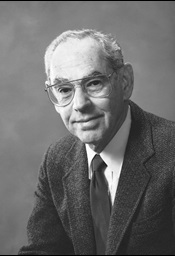The American Society of Hematology Honors Stanley L. Schrier, MD, with the 2019 Exemplary Service Award
 (WASHINGTON, October 18, 2019) – The American Society of Hematology (ASH) will recognize Stanley Schrier, MD, a past ASH president and formerly Professor Emeritus of Medicine in Hematology at Stanford School of Medicine in Stanford, California, with the 2019 Exemplary Service Award for his exceptional years of service and dedication to ASH and to hematology. Dr. Schrier passed away in August.
(WASHINGTON, October 18, 2019) – The American Society of Hematology (ASH) will recognize Stanley Schrier, MD, a past ASH president and formerly Professor Emeritus of Medicine in Hematology at Stanford School of Medicine in Stanford, California, with the 2019 Exemplary Service Award for his exceptional years of service and dedication to ASH and to hematology. Dr. Schrier passed away in August.
The Exemplary Service Award was established in 1998 to recognize an individual whose outstanding service, extending over a period of years, has significantly advanced the interests of the Society. ASH President Roy Silverstein, MD, will present this award during the 61st ASH Annual Meeting and Exposition this December in Orlando, Florida.
“Dr. Schrier was an exemplary colleague, mentor, collaborator, and physician whose impact transcends borders – from the United States and South America to Africa and Asia. He has served as a dedicated volunteer for ASH’s global programs, never missing an opportunity to collaborate and enthusiastically sharing his expertise with colleagues all over the world,” said ASH President Roy Silverstein, MD, of the Medical College of Wisconsin in Milwaukee. “We value Dr. Schrier’s contributions to hematology and honor his decades of service.”
Dr. Schrier served as the president of ASH in 2004. His research interests in red cell biology led to a more than 20-year effort to understand the pathophysiology of the thalassemia, with projects in countries with high rates of thalassemia: Israel, Italy, and Thailand. Dr. Schrier was celebrated by colleagues not only for his research but also for his commitment to providing compassionate care to thousands of patients during his 60 years at Stanford. He was also a talented educator of both physicians and scientists. He continued to conduct research and treat patients up to two months before his death.
Dr. Schrier was a founding member of the ASH-supported International Consortium on Acute Leukemia (ICAL), an international network that brings together clinical investigators from Europe, North America, and South America to improve the care of patients with acute leukemia through clinical and laboratory collaboration. He had been a strong supporter and deeply committed member of the network since its inception in 2004, during his term as ASH president. Dr. Schrier was also instrumental in establishing ASH’s partnership with Health Volunteers Overseas (HVO), an outreach program dedicated to bringing consultation and training to hospital personnel in Uganda, Tanzania, Peru, and Cambodia. Dr. Schrier served as chair of the HVO hematology steering committee from 2007 to 2013.
Dr. Schrier had been a dedicated ASH member, as demonstrated by his service as chair and member of various committees including the Committee on Educational Affairs (Member, 1993-2001); Ad Hoc Committee on Outreach (Chair, 2006-2007); and the ASH Executive Committee (President, 2004). In addition to his numerous research and leadership accolades, Dr. Schrier was known as an extraordinary mentor, having trained several world leaders in academic hematology. He received the prestigious ASH Mentor Award in 2013. In addition to his service to ASH, Dr. Schrier served as hematology editor of UpToDate, an online medical information service.
The American Society of Hematology (ASH) (www.hematology.org) is the world’s largest professional society of hematologists dedicated to furthering the understanding, diagnosis, treatment, and prevention of disorders affecting the blood. For more than 60 years, the Society has led the development of hematology as a discipline by promoting research, patient care, education, training, and advocacy in hematology. ASH publishes Blood (www.bloodjournal.org), the most cited peer-reviewed publication in the field, and Blood Advances (www.bloodadvances.org), an online, peer-reviewed open-access journal.
Contact:
Sara Khalaf, American Society of Hematology
[email protected]; 202-552-4925